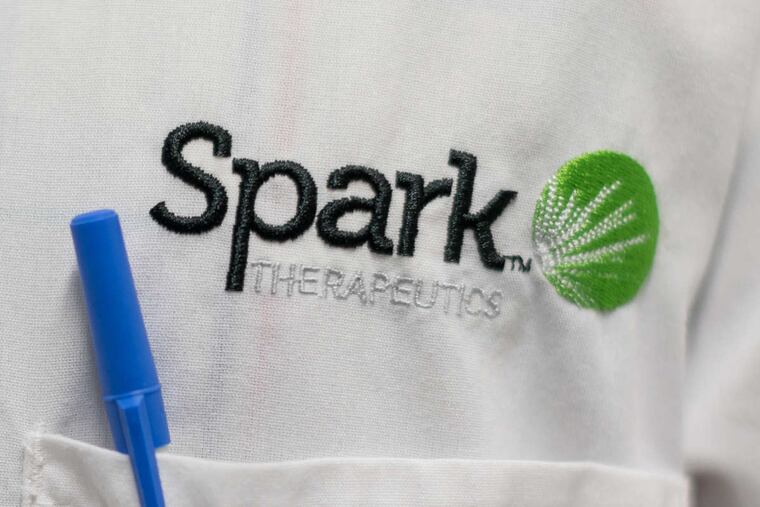Spark Therapeutics to appear before FDA advisers about gene therapy for blindness
Spark Therapeutics will be questioned by a Food and Drug Administration panel this week about its gene therapy to treat a rare inherited blindness.

Philadelphia drug developer Spark Therapeutics will face questioning Thursday by U.S. Food and Drug administration medical experts on the company's pioneering gene therapy that restores vision in patients with a rare hereditary blindness.
The FDA panel, whose recommendations are advisory to the FDA, will consider questions such as whether Spark's treatment — which injects a copy of a normal gene directly into the eye's retina — meets its end point and whether patients may need multiple treatments to preserve vision improvements.
The treatment, if approved by the FDA in January, would be the first gene therapy approved in the United States for an inherited disease.
Spark's treatment, voretigene neparvovec, has received "priority review" by the FDA for vision loss due to RPE65 mutation-associated retinal dystrophy, which affects about 3,500 people in the United States and Europe, and has no approved treatments.
FDA briefing documents, posted online Tuesday, said the "totality of the data" from clinical studies showed the treatment "provides a clinically meaningful benefit for patients, leading to sustained improvements in both functional vision and visual function." Spark was spun out of Children's Hospital of Philadelphia after decades of research led by Katherine A. High, Spark's cofounder.
The 149-page review concluded the therapy has an "acceptable safety profile based on up to nine years of cumulative" post-administration follow-ups in patients.
Most side effects were related to the administration procedure — an injection — and not the gene product. "Most adverse events occurred early and resolved over time," the document said. The overall efficacy and safety "demonstrated that the benefit-risk balance is strongly in favor" of the treatment.
Analysts at Cowen & Co. said the briefing documents for the meeting with the Cellular, Tissue, and Gene Therapy Advisory Committee "look relatively benign. We expect a positive vote."
If the FDA gives the green light, around Jan. 12, Spark's treatment will be commercialized under the brand name Luxturna.
The advisory panel's only voting question will be whether Luxturna's benefit-risk warrants FDA approval.
"Our physician consultants have been emphatic that Luxturna's clinical data are compelling, so we expect a positive vote," Cowen analyst Phil Nadeau said in a client note. "The documents also suggest that the FDA supports a broad, genetic-based label" that could apply to other rare genetic retinal disorders.
Cowen predicted that sales will be $100 million next year and reach $650 million in 2022. The disease symptoms often begin as "night blindness," but progress to near total blindness. Most people experience vision loss before age 18.
Clinical trials showed the treatment improved vision in patients for up to three years, with observation ongoing, and with a safety profile consistent with this type of injection procedure, the briefing document said. Patients will be followed for 15 years.
Analysts at Cowen said the FDA document "contained few surprises. The major topic of discussion will be the clinical meaningfulness of the primary end point data on multi-luminance mobility testing (MLMT)," Nadeau noted.
The advisory committee will also discuss the appropriate ages to give the therapy to patients. Data showed less benefit in older patients with more advanced disease. FDA advisers may recommend Luxturna for patients, ages 4 to 44, with earlier stages of the disease.
Spark's treatment is onetime because of concerns that repeat injections could lead to serious immune reactions. "We generally expect a warning that repeat administrations into the same eye should not be done," Nadeau wrote. Long-term data on eight patients from a Phase 1 trial showed the treatment's effect continued "to be durable for at least four years after administration," he said.
Spark chief executive officer Jeffrey D. Marrazzo has said the company would not discuss pricing before the FDA approves the product.